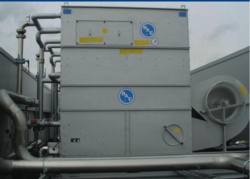Cooling tower can operate wet or dry

Three cooling methods are exploited in Baltimore Aircoil’s HFL cooling tower to minimise water consumption.
A new closed-circuit cooling tower from Baltimore Aircool can operate in three modes: combined dry/wet; adiabatic and fully dry. HFL cooling towers have an intelligent controls package to switch between these modes to match requirement and minimise water consumption by operating in adiabatic or dry mode as much as possible. Capacities of up to 2 MW are available from a single unit, with water consumption being reduced by 40% compared with conventional cooling towers. The water to be cooled is in a sealed circuit, preventing it being contaminated. This tower has a conventional heat-exchange coil and a secondary water recirculating system which is used during dry/wet and adiabatic operation. Dry cooling is achieved by a finned coil above the drift eliminators of the wet section. In all modes, the fluid to be cooled is fed to the finned coil, where the maximum possible economic cooling is achieved. In dry/wet mode, the fluid then passes through the wet exchange coil, where evaporative cooling gives low cold-water temperatures, comparable to a conventional cooling tower. Water is delivered by a secondary water spray pump. In adiabatic mode, the spray pump remains on, efficiently pre-cooling the air as it passes up through the cooling tower. In this mode, the fluid to be cooled completely bypasses the heat-exchange coil by means of a 3-way valve. In this way, no water is evaporated in cooling the fluid; the only water used is the small amount evaporated to achieve adiabatic pre-cooling of the air. When operating in dry/wet or adiabatic mode, the construction of the HFL cooling tower complies with HSE Guidance L8 for the control of legionella.
Related links:


